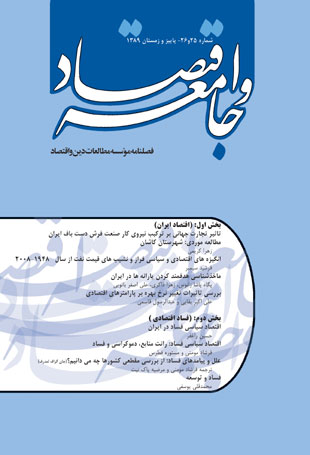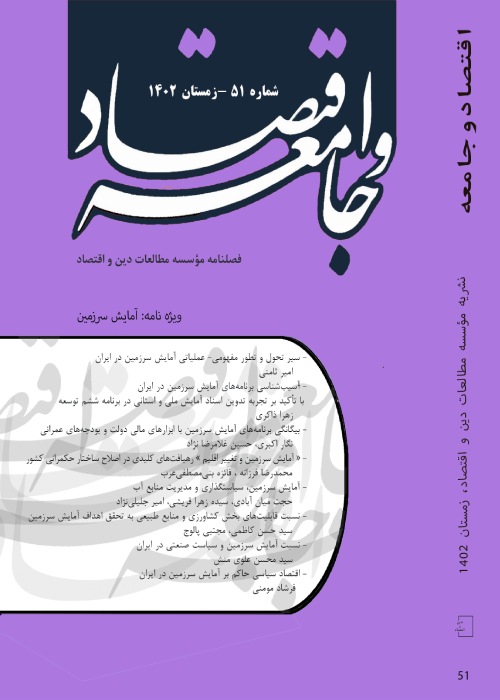فهرست مطالب

نشریه اقتصاد و جامعه
پیاپی 25-26 (پای ی ز و زمستان 1389)
- بهای روی جلد: 20,000ريال
- تاریخ انتشار: 1389/12/28
- تعداد عناوین: 9
-
صفحه 7
- بخش اول: اقتصاد ایران
-
تاثیر تجارت جهانی بر ترکیب نیروی کار صنعت فرش دست باف ایران / مطالعه موردی: شهرستان کاشانصفحه 11
- بخش دوم: فساد اقتصادی
-
صفحه 115
-
صفحه 229
-
Page 11Every country tries to reduce the cost of production in order to increase its exports.Globalization of world economy have intensified competition,leading to winning and loosing parties. In this process, the share of most of Iran traditional exportsincluding the hand woven persian carpet in the world marlkets are declining. Using questionaires,our field work study show that competition among carpet woven industries to capture larger share of market have been responsible for the decline in realwages of workers,thereby leading to change in the composition of labour force in this industry.In This study we have found that the middle class familly who were traditionally busy in this profession have moved to other activities and their place have been occupied by Afghan Immigrants and refugees who are willing to accept lower wages,as such they are dominating the labour force in this industry.
-
Page 37The purpose of this study is to show that concentration on economic reasons may be inadequate to explain fluctuations in oil prices, and It may need a broad based study taking into account political economy and international relations. In this study Wehave followed a historical and analytical apporoach reviewing the events relating to hundred years of the last century and examining the first decades of the third millenium emphasizing on historical evidence to highlights that the main forces behindoil price fluctuation has been political and even ideaological.We reached this conclusion that competition among greate powers and their interaction with each other Play a very important role in determining oil prices.But as we approach the latest years, wefound that the role of organiztions supporting environment and the firms active in in new energy sources increasingly becom important in this regards.
-
Page 51With increasing importance of subsidy in the last two decades, reasearchers have followed different approaches to estimate the socio-economic implication of lifting subsidies on energy carriers and basic goods on inflation and other price indices.Reviewing different researches we have found that there is vast differences in methods, statistical bases and conclusion reached.This is though important but so far has not been paid due attention.In this paper we have surveyed 60 research Papaers, projects, published books and reports,we found that in 55casese somehow and the other they used such approaches as IO,SAM and CGE and or partial econometrics while the rest were mostly explanatory and analytical. We have classified these studies in three groupes.The first group deals with increase in prices of energy carriers and analysis its impact on their consumption.The secound group of studies evaluate the impact of rise in the prices of energy carriers and basic goods on increase in consumers and producers price indices and the third groupof studies examine the impact of lifting subsidies on cost of living of different socio economic groups of households and macroeconomic Variables?The main focus of this study is to examine different aspects of the question raised above and to proposes suitable approaches for future researches.
-
Page 91Interest rate is one and even the most important macroeconomic variable through which monetary policy exert its impcts.Because of having significant impact on macrovariables such as volume of deposits, amount of Investment,rate of Inflation,asset prices,exchange rate and demand for money and capital flight etc, its determination need carefull study and prior evaluation of the sensetivity that these monetery variable show with respect to the interest rate.The wise management and determination of appropriate interest rate would have suitable impact on the economy and play an important role in directing capital towards full employment equilibrium. However, unwise decision in this regards, would disturb markets leading to either inflation, or deflation and or both, creating stagflation.In this study we examine the views expressed by experts and economists in order to analysis the impact of change in interest rate on economicparameters.It is hoped that with new research projects the extent and intensity of the impact of interest rate would be evaluated scientifically so that we can have an accorate and better picture of the economic performance.
-
Page 115Corruption affect decision making, allocation of resources and thereby would have a destructing impact on economic development and welfare of future generations, in various ways.Parasit Economy and its various kinds are pecularity of countries depending on natural resources such as oil and gas for their livelyhood.Production is the first victim of such parasit economy which is sacrificed and being replaced by brokeage and intermediry activities, helping development of other countries exporting goods to Iran markets.The result of such parasit economy is poverty traps prevailing everywhere in the country. Institutional design unsuitable for production and economic development but acting as faciliators of imports and expansion of brokerages and intermediary activities areother outcomes of corruption. Formation of such structure,on the supply side suppress production and on the demand side stimulate demand leading to persistance of structural inflation in Iranian economy.Such phenomena is mianly responsible for poverty and inequality as prevailing in the country.In such economic structures the winners are affluents and the losers are the poor masses.In this paper we try to highlight such processderiving on the country rich development experience.
-
Page 147Most of socio-economics and political problems of rentier economies can be well explained in terms of their dependancy on revenue earned from exports of oil, gas and other naturalresources.Corruption is directly related to such activities.Rent seeking activities affect political structures of such socities. Windfall gain from oil exports provide little incentive fordesigning appropriate tax system,undermining transparency and accountability which are the bases of democracy.As it is expected and varified by various scholars there is a negative relationship between democracy and corruption.As the countries move away from democracy, they intensify corruption.In this paper we concentrate on analysing theoretically, the relationship between rent seeking, democracy and corruption, deriving on the published reports by Transparency international Organization using Indices of democracy and corruption of different countries to support our arguments.We came to this conclusion that rentier economies, lacking democratic system would havemore corruption than others.Unlike other countries,Canada and Norway, despite their rich natural resources have relatively little corruption owing mainly to their democratic systems
-
Page 165In recent years a growing body of empirical work has examined the causes and consequences of corruption. These investigation are mostly cross-country analyses, based on comparative assessments of the extent of corruption in various countries. Such assessment are sometimes compiled by privateagencies to determine country risks, and the data gathered are sold to investors. Other sources are surveys of the generalpublic or elite businesspeople. The data on corruption are thus based on subjective perceptions and expertise, and empirical work using these indices assumes that they are correlated with underlying real levels of corruption. With the exception of somemicro-level studies, perceptions data are the only information available on corruption levels. Efforts to use objective data, such as conviction for corruption or office, suffer from inherent biases that undermine their validity and are not available across a large cross-section of countries. Recognizing the limitations of perception-based indices, researchers have nevertheless been able to use them to significantly advance the study ofcorruption. These data allow empirical research on corruption to move beyond the anecdotal descriptions and purely theoretical considerations that previously dominated.
-
Page 229Corruption is abuse of public trust for private gain. It is a symptom of failed policies, an evil phenomenon that has a wide range of corrosive effects on societies. It underminesdemocracy and the rule of Law, leads to violation of human rights, distorts market, erodes the quality of life and distorts competition. It is a main obstacle of economic development. Poverty and illiteracy together with adoption of inappropriate development strategy, negligence of democratic institutions and the rules and regulations of civil society, convert corruption to cancer diseases, endangering the very foundations ofeconomic, social and political life. It has to be eradicated as early as possible. Attempt has to be made directly, to reduce the discretion of public officials and increasing the probability of detection of corrupt behaviors through appropriate rules and regulations. While strengthening the monitoring procedures is important, efforts have to be made to enforce contracts and protect the rights of individuals. Speedy and stiff punishment ofwrongdoers is very significant in this regards. At the same time, it is essential to undertake fundamental changes in policies and institutions. Transparency and accountability, reduction of concentration of power and establishment of democraticinstitutions and the rule of law, help to empower the people to have a social watch on authorities, thereby, reducing opportunity for corruptive behaviors.


